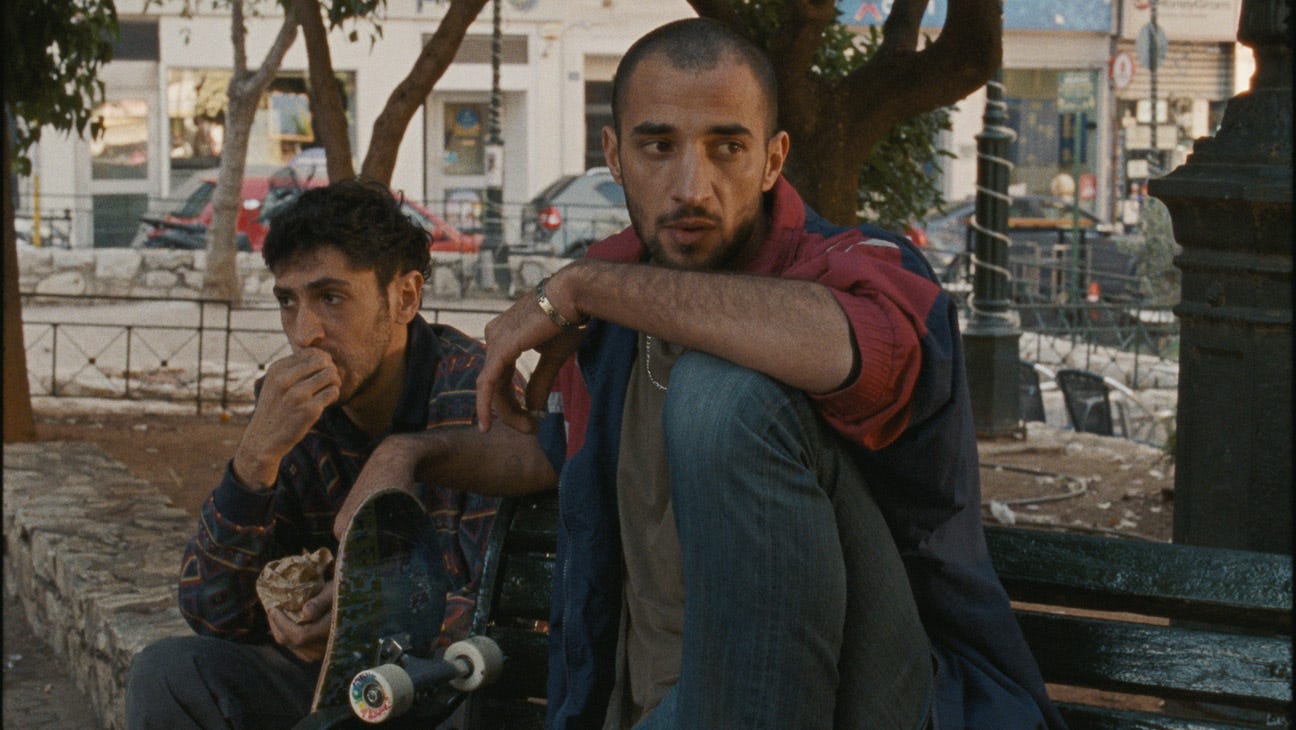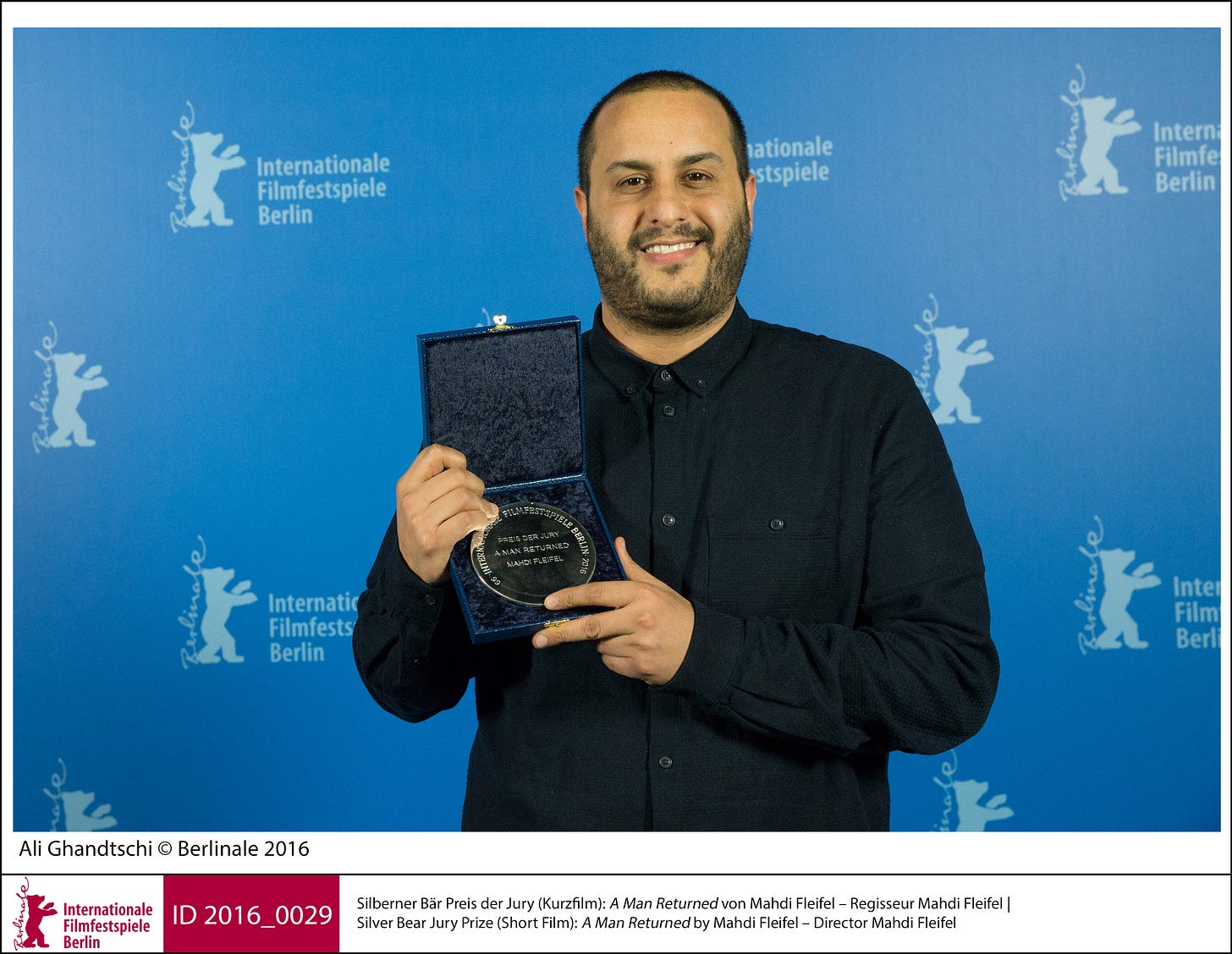From camps to Cannes: When Palestinian politics crash the Croisette
In "No Other Land" and "To a Land Unknown", art and politics collide to reveal global hypocrisy and the continuous fight for Palestinian dignity.
(Note: instead of recommending No Other Land once again to watch in cinemas this week because of its now wide-American release, here’s an essay I wrote for another Substack channel that ghosted me when I delivered it.)
A Palestinian refugee in Athens becomes addicted to heroin, gets paid for anonymous sex in a park, and steals a purse with only seven euros inside in the short film “Xenos”. Another Palestinian man, Reda, returns to the Ain el-Helweh refugee camp in Lebanon after three years in Athens with a heroin addiction, gets married, has three children, and goes back to Athens, where he dies six months later of an overdose, as seen in the short film “A Man Returned”. These are the unfortunate events the director of both films, Mahdi Fleifel, born in the Ain el-Helweh refugee camp, experienced.
Mahdi Fleifel documented the realities of his friends and family in a Palestinian refugee camp that he was fortunate to escape from. He became a Danish citizen and was able to document enough tragedy while visiting home (Ain el-Helweh) to make a superb documentary feature in 2012, A World Not Ours (Alam laysa lana). In the following twelve years, Fleifel continued filming his community from one human rights violation to another in short films. These stories were then compiled into a fictionalized version, but no less true, in the form of a feature film, To a Land Unknown.
Premiering at the Cannes film festival in 2024, To a Land Unknown then won the international co-production award at the Munich film festival. Being the second-tier film festival of Germany, Fleifel didn’t attend and couldn’t give a speech. This most likely came down to capacity or scheduling or infrastructure reasons, but also, the Munich organizers may have been consciously avoiding a public scandal à la No Other Land at the Berlinale several months earlier.
No Other Land is a documentary directed by four individuals but specifically about two of them, Yuval Abraham (Israeli) and Basel Adra (Palestinian), who formed a bond despite their disparate living conditions. Abraham and Adra accepted two awards at Berlinale (best documentary for both the festival overall and Panorama section), and while giving their speech, Abraham called out the injustice of their situation: Adra, who lives thirty minutes away in the West Bank, can neither vote nor easily defend land against an apartheid state’s steady and violent encroachment. The film documents the daily destruction of Palestinian homes, a delicacy of the Israelis, in Adra’s hometown.
Amplified, grossly mutated, and putrefied in only 48 hours, right-wing Germans protested Abraham’s mild anti-genocide statements to the top-levels of German politics and society. Berlin Mayor Kai Wegner and German Culture Minister Claudia Roth, who both attended the ceremony, publicly disavowed the two young filmmakers after footage of them clapping during the speech leaked. The festival directors, who Roth sacked and belittled into submission before the festival began before partially defunding the festival so that the German military could have it instead, stayed silent. Cowardice, fecklessness, and dishonorable; is this how the politicians and leaders who host an international festival treat their guests? It’s especially ironic given that the Berlinale is proudly the “political” film festival. On the first day’s press conference, Berlinale jury president Lupita Nyong'o was asked what she thought about the festival being political; she said she’d wait to see.
What does it mean for a film festival to be political today? We don’t live in the black & white days when fascists controlled the Biennale and the Berlinale was created by an American propagandist to promote “democracy” and “freedom” at the start of the Cold War. Cannes festival officers now ask attendants to take off small pins of solidarity for their own workers—a far cry from the time when Godard and Truffaut shut down the 1968 festival, the former having proclaimed: “We’re talking solidarity with students and workers and you are talking dolly shots and close-ups”—and Palestinians. And at Berlinale they will give you two awards for your achievement, government officials will cow-tow to conservative interests, and if you’re Palestinian your house will be mobbed by right-wing Israeli thugs while you’re (luckily) out of the country, which happened to Adra in February 2024 and still happening as of January 2025. At every international film festival, organizers promote the benefits of people across the world coming together in friendly competition to show the best of what we can do. But why do they bother?
To keep their “most political film festival” bonafides last year, Berlinale hosted a range of Ukrainian artistic-cultural events and banned Russians. (One of Berlin Mayor Kai Wegner’s charges against Abraham’s speech was that it was too one-sided in their condemnation.) The Munich film festival similarly hosted a number of Ukrainian films and sales-promotion events for producers this year (in the Amerikahaus too). Even without this financial and political support, the only Palestinian film at both of these festivals were the winners of their categories. It was the jury members and the audiences who quietly supported and awarded these films and not the organizers and mouth-pieces calling for “democracy” while simultaneously complaining about its implementation.
But it’s all too easy to say that Berlinale is too hypocritical to be openly political while having strong national and commercial interests. The Ukrainian-Palestinian dichotomy of support has proven the hypocrisy of many in charge, where one is embraced and the other held at a distance. And when the distant, far-away one breaks through from the refugee camps, all hell breaks loose.
This ironic distance isn’t dissimilar to how Fleifel and Abraham feel: they can come and go at will while those emotionally and physically close to them are stuck. Reda, one of the protagonists in Fleifel’s To a Land Unknown named after one of his best friends discussed in the opening paragraph, and Adra were/are fighting for dignity, family, and country. It’s no coincidence that the word “land” is featured in both film titles: no land, no hope, as stated at the end of “20 Handshakes for Peace”, another Fleifel short film about the disgrace of Palestinian leader Yasser Arafat, in front of ejaculatory, red-rocket Bill Clinton, reaching out to shake Israeli prime minister Yitzhak Rabin’s hand after selling out Palestinian’s post-1967 land to Israel in 1993. Reda and Adra have been fighting back ever since.
Fleifel and Abraham and others are valuably helping by bringing their stories outside of the silo of “Palestinians seen as Victims without a voice”. This is politics, and when it comes too close, within arm’s reach, and is real, not superficially applied, people in power over-react by creating and amplifying media talking points or fixing our attention on non-dimensional cultural issues. At least film festivals don’t pretend to be democratic.
Thank you once again for checking out my Substack. Hit the like button at the top or the bottom of this page to like this entry, and use the share and/or res-stack buttons to share this across social media. Leave a comment below if the mood strikes you to do so. And don’t forget to subscribe if you haven’t done so already.







